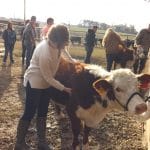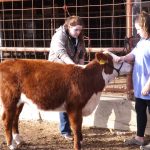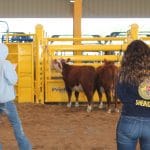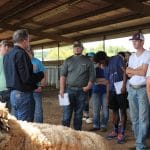| Department: | |
| Hours Required: | 127 |
| Categories: | Major, Undergraduate |
| Delivery: | On-Campus |
Today’s veterinarian is a medically trained, scientifically-oriented professional, capable of rendering many services and accepting wide responsibilities in all areas of animal health and in many areas of public health. Such a challenging career stimulates the interest of students; therefore, the competition for vacancies in veterinary medicine is high.
While most of the pre-veterinary medicine curriculum can be completed in two years, many students are finding it advisable to spend three or four years in completing these requirements. During this time, they also take additional courses leading to a degree in agricultural sciences. Many students are completing degrees before they enter a college of veterinary medicine.
Interested students should anticipate spending three to four years at college preparing for admission to any school of veterinary medicine. Students trying for admission need to maintain a high grade point average in college, especially in science courses. After receiving the applications, some schools arrange for interviews with prospective students to gauge their interest and knowledge of veterinary medicine and their likely success as a veterinarian. Students should have previously gained exposure to veterinary medicine, possibly by working with one or more veterinarians.
The Department of Agriculture always stands ready to assist students in fulfilling their pre-veterinary medicine requirements, whether they wish to do it in a two-year span or over three or four years. The supporting departments at the University – including biology, chemistry, and English – offer quality courses that provide students with an excellent background for the pursuit of veterinary medicine.
Learning Goals
- Our graduates communicate effectively
- Our students acquire knowledge of agricultural systems to make ethical and informed decisions relating to food and fiber production
- Our students can assimilate knowledge to develop critical thinking skills related to agriculture production and science
- Our graduates understand the value of technology and its application in Agricultural Communication and Agriculture Production
- Our graduates possess knowledge in the field of Agriculture
Pre-Veterinary Science Option Courses (127 hours required for Degree) University Requirement - 2 hours GSTD 1002 Freshman Seminar General Education* - 24 hours (Mathematics, natural science and physical science courses are included in the major.) *Social Science requirement - AGEC 2073 Principles of Agricultural Economics Biological Science - 19 hours BIOL 1203/1201 Principles of Biology I/Lab BIOL 1213/1211 Principles of Biology II/Lab BIOL 2403 Medical Terminology BIOL 3023/3021 Microbiology/Lab BIOL 3033/3031 Genetics/Lab Chemistry - 16 hours CHEM 1023/1021 University Chemistry I/Lab CHEM 1123/1121 University Chemistry II/Lab CHEM 3003/3001 Organic Chemistry I/Lab CHEM 3073/3071 Biochemistry I/Lab Physics - 8 hours PHYS 2003/2001 College Physics I/Lab PHYS 2103/2101 College Physics II/Lab Mathematics - 6 hours MATH 1023 College Algebra MATH 3043 Applied Probability and Statistics I Communications - 3 hours SPCH 1113 Introduction to Public Speaking Agricultural Core – 25 hours AGEC 3043 Farm Management AGRI 4033 Issues in Agriculture ANSC 1000 Farm Experience ANSC 1003/1001 Introduction to Animal Science/Lab ANSC 2002/2001 Animal Nutrition I/Lab ANSC 2013 Animal Anatomy and Physiology PLSC 1003 Introduction to Plant Science PLSC 2002/2001 Principles of Horticulture/Lab PLSC 2012/2011 Soils Science/Lab Agricultural Science - 24 hours ANSC 3013 Animal Diseases and Health ANSC 3023 Animal Nutrition II ANSC 3042/3041 Animal Reproductive Physiology/Lab ANSC 3053 Animal Breeding ANSC 4003 Advanced Animal Physiology PLSC 3013 Forage Production Select six hours from the following: ANSC 4102/4101 Beef Production/Lab ANSC 4122/4121 Swine Production/Lab ANSC 4132/4131 Poultry Production/Lab AGRI 4452/4551 Internship in Agriculture I and II
University Requirement (2 hours)
GSTD 1002 – Freshman Seminar
General Education (24 hours)
Note: 11 hours of mathematics, natural science, and physical science courses are included in the major. AGEC 2073 – Principles of Agricultural Economics is required.
Agriculture Core (25 hours)
AGEC 3043 – Farm Management
AGRI 4033 – Issues in Agriculture
ANSC 1003 – Introduction to Animal Science and ANSC 1001 – Introduction to Animal Science Lab
ANSC 2002 – Animal Nutrition I and ANSC 2001 – Animal Nutrition I Lab
ANSC 2013 – Animal Anatomy and Physiology
PLSC 1003 – Introduction to Plant Science
PLSC 2002 – Principles of Horticulture and PLSC 2001 – Principles of Horticulture Lab
PLSC 2012 – Soils Science and PLSC 2011 – Soils Science Lab
Agricultural Science (24 hours)
ANSC 3013 – Animal Diseases and Health
ANSC 3023 – Animal Nutrition II
ANSC 3042 – Animal Reproductive Physiology and ANSC 3041 – Animal Reproductive Physiology Lab
ANSC 3053 – Animal Breeding
ANSC 4003 – Advanced Animal Physiology
PLSC 3013 – Forage Production
Select 6 hours from the following:
ANSC 4102 – Beef Production and ANSC 4102 – Beef Production
ANSC 4122 – Swine Production and ANSC 4121 – Swine Production Lab
ANSC 4132 – Poultry Production and ANSC 4131 – Poultry Production Lab
AGRI 4452 – Internship in Agriculture I and AGRI 4551 – Internship in Agriculture II
Biological Science (19 hours)
BIOL 1203 – Principles of Biology I and BIOL 1201 – Principles of Biology I Lab
BIOL 1213 – Principles of Biology II and BIOL 1211 – Principles of Biology II Lab
BIOL 2403 – Medical Terminology
BIOL 3023 – Microbiology and BIOL 3021 – Microbiology Lab
BIOL 3033 – Genetics and BIOL 3031 – Genetics Lab
Chemistry (16 hours)
CHEM 1023 – University Chemistry I and CHEM 1021 – University Chemistry I Lab
CHEM 1123 – University Chemistry II and CHEM 1121 – University Chemistry II Lab
CHEM 3003 – Organic Chemistry I and CHEM 3001 – Organic Chemistry I Lab
CHEM 3073 – Biochemistry I and CHEM 3071 – Biochemistry I Lab
Physics (8 hours)
PHYS 2003 – College Physics I PHYS 2001 – College Physics I Lab
PHYS 2103 – College Physics II and PHYS 2101 – College Physics II Lab
Mathematics (6 hours)
MATH 1023 – College Algebra
MATH 3043 – Applied Probability and Statistics I
Communication (3 hours)
SPCH 1113 – Introduction to Public Speaking
Total Hours – 127
Degree: Pre-Veterinary Science
Employer: Arkansas Children’s Hospital
Position: Animal Research Assistant
As an animal research assistant, I assist in performing specific tasks such as surgeries, necropsy, data analysis and formulating diets for the animals. My knowledge of animal anatomy and physiology and animal nutrition has helped me excel in my career. My employer was pleased to know that I had a background in animal science because it made the choice of hiring me a no-brainer and I transitioned into the job seamlessly.
Degree: Pre-Veterinary Science
Employer: Magnolia Veterinary Services
Position: Veterinary Technician
The courses I took helped me get the foot in the door to this clinic. I was also a step ahead in my knowledge of anatomical and physiological side of the animal medicine world.
Degree: Pre-Veterinary Science
Employer: LSU School of Veterinary Medicine
Position: Student
My degree helped prepare me for the challenges of veterinary school. It also took me out of my comfort zone because I knew nothing about agriculture, so the degree made me more well-rounded. Ultimately the most helpful part of my degree was the professors who mentored me and helped me achieve my goal of being accepted into veterinary school







